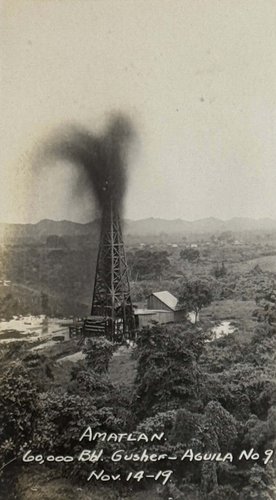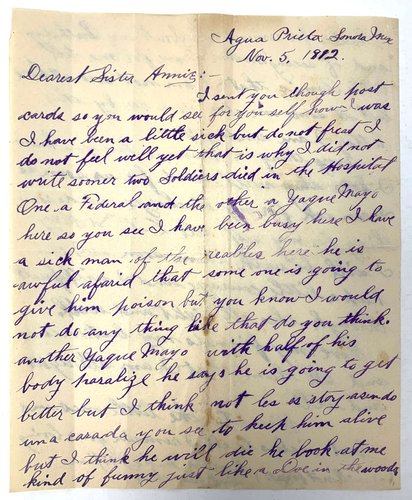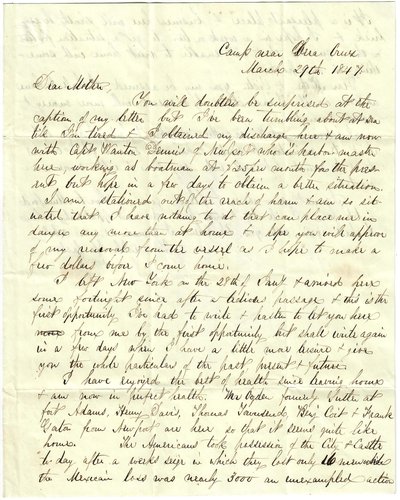


#MA55
April 1848
Quarto bifolium ca. 24 x 20.8 cm (9 ½ х ¾ in). 2 pp. and -. Brown ink on yellowish wove paper. Addressed and stamped on the recto of p.1 ‘Vera Cruz, Mexico. April, 26'. Fold marks, slightly age-toned, a four-inch tear repaired with tape, some separation along fold lines, but overall a very good letter written in a legible hand.
A historically important original autograph manuscript letter written by 1st Sergeant of the 7th US Infantry Regiment, William T Dorrance, from occupied Mexico City and signed to his cousin Edward Moulton in Willimantic, Connecticut, sharing breaking news of the arrival of two US Commissioners “empowered to settle the terms” of the Treaty of Guadalupe Hidalgo, heatedly arguing about the possible need of marching to San Luis Potosi and giving the Mexicans “a drubbing” there, decisively claiming that “the question of Peace or War rests now entirely with Mexico,” and mentioning several American political figures, including Nicholas Trist, Nathan Clifford, and Ambrose Sevier.
Documenting a turning point in the prolonged negotiations between the US and Mexico, the letter was written only a month before the Treaty of Guadalupe Hidalgo was finally ratified by the Mexican legislature.
Two years after the outbreak of the Mexican War and shortly after the American occupation of Mexico City, the armed conflict entered a new intense stage of negotiations. Following two unsuccessful attempts to reach an agreement, both sides finally signed Nicholas Trist’s third Treaty draft on 2 February 1848. The next month, the US applied several amendments to the document and ratified the Treaty on 28 March 1848. Unsure whether Mexico would approve of the revised Treaty, the US sent two commissioners to explain the amendments to the Mexican Government. After much deliberation, the Mexican legislature finally ratified the document on 19 May 1848, officially ending the two-year-long war.
Dated 20 April 1848, the letter was written by William T Dorrance (Ca. 1805-?) from occupied Mexico City almost immediately after the announcement that the American Commissioners had reached Mexico. The author, 1st Sergeant of the 7th Infantry Regiment (1843-1850), US Army, took part in the Mexican-American War and actively participated in the capture of Mexico City.
In the letter addressed to Edward Moulton (ca. 1824-1855) in Willimantic, the author excitedly shares with his “respected cousin” the breaking news of Nathan Clifford and Ambrosie Sevier’s arrival in Mexico. The letter writer enthusiastically contemplates how the treaty concluded by Nicholas Trist “is going to fare with the Mexican Congress” and decisively claims that “the question of peace or war rests now entirely with Mexico.” In the text, Dorrance also mentions the Mexican Government’s rumored hesitation about the Treaty and comments on the recently failed uprising in San Luis Potosi, furiously discussing the possible need to give the Mexicans “a drubbing.” The rest of the letter features interesting remarks on the gradual development of Willimantic, notes on the author’s health, and private messages to his relatives back in Connecticut.
Seven years later, the recipient of the letter, Edward Moulton, died of self-inflicted injuries at the age of thirty-one in Willimantic, Connecticut.
Overall, a historically important original autograph manuscript letter offering a unique insight into a turning point in the prolonged negotiations between the US and Mexico.
The text of the letter (original spelling and punctuation preserved):
“The paper which you sent me came to hand in due time, wherein I’m pleased to learn that my friends in the Willimantick and vicinity are all well, it also gives me pleasure to perceive that your place is still improving, and keeping apace, with the times in which we live, as I’m ready to conclude, from the number of advertisements in that paper, I should have written sooner but haven been waiting untill I had something of importance to communicate that would be news, and interesting to you, The Hon. Mr. Clifford, one of the American Commissioners arrived here the 11th of this month, the other, the Hon. Mr. Sevier arrived on Saturday evening last, the 16th of this month, and as we now have two American Commissioners, upon the soil of Mexico, empowered to settle the terms of a treaty with the Mexican Government, we shall doubtless know in a few days, how the treaty concluded by Mr. Trist, and ratified by the United States Congress, is going to fare with the Mexican Congress. On Monday the 17th of this month we had news that there were members enough of the Congress assembled, to form a Quorum, and again on Tuesday it was rumored that the Congress had dissolved, demanding six months to determin upon the ratification, or rejection of the present treaty. At all events we shall soon know, and if we are not to have peace, soon, it is my opinion that we shall have to march to St Louis Potosi, and give them a drubbing there, the question of Peace or War, rests now entirely with Mexico. You may inform the Captain that as soon as the case is decided, I shall send him word without fail. I would here state that my health is as good now as I usualy enjoy in this country, you would do me a favour by writing me a few lines as soon as this reaches you. Give my best respect to your Father, and Mother, and to all my friends in your vicinity. If Brother Charles is in your neighbourhood, tell him that if he will send me a few lines, they shall meet with prompt attention from me.
Pleas to send me another of your Willimantick papers, remember me to uncle Tinken and his family, and to all enquiring friends. I must now draw to a close assuring you that if any thing of importance transpires, you shall hear from me again soon.”










